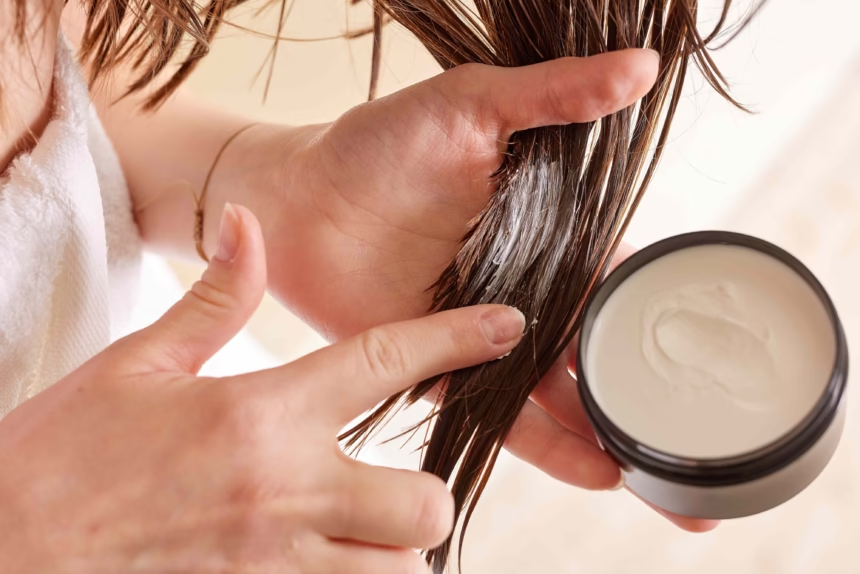
Coconut oil has anti-inflammatory, antifungal, and antibacterial properties, which can help reduce the risk of infections that can lead to or worsen a dry, flaky scalp.
There are a few ways to use coconut oil to help improve your scalp and hair health.
How to do it: Gently massage melted coconut oil into your scalp and through the lengths of your hair, making sure it’s evenly distributed from root to tip. Once applied, leave the oil on for a few hours or even overnight to allow it to deeply penetrate and condition your hair.
Benefit: This helps restore moisture, reduce dryness, and improve shine and manageability. Over time, regular use can help nourish and soften your hair and scalp, leaving them feeling smooth, healthy, and revitalized.
How to do it: Apply a small amount of coconut oil to your hair about 30 minutes before shampooing to serve as a nourishing pre-wash treatment. For best results, gently warm the oil between your palms before applying, then comb it through to ensure even distribution.
Benefit: Helps protect the hair by creating a light barrier that prevents it from absorbing too much water during washing—a process that can sometimes lead to dryness and damage. Regular use of this pre-wash treatment can leave your hair feeling smoother, more manageable, and better hydrated, especially if you tend to have dry, frizzy, or chemically treated hair.
How to do it: Add a small amount of coconut oil to your conditioner before application, or you can use coconut oil in place of your conditioner. Warm the oil slightly in your hands until it becomes liquid, then apply it evenly throughout your hair, focusing on the mid-lengths and ends where dryness is most common. Leave it on for a few minutes to allow the oil to penetrate deeply and nourish the strands, then rinse thoroughly with warm water.
Benefit: The oil works to boost the conditioner’s moisturizing properties, helping to lock in hydration and smooth the hair cuticle. This combination can make your hair feel softer, silkier, and more manageable after rinsing. Regularly using coconut oil in this way can help strengthen your hair, reduce frizz, and restore shine—especially if your hair is prone to breakage or has been exposed to heat styling or chemical treatments.
Choose a high-quality coconut oil for using it on your skin by opting for varieties that are labeled unrefined or virgin. These types of coconut oil come from fresh, raw coconuts and do not contain chemical additives.
Avoid refined coconut oils, which have been bleached and treated with chemicals that may irritate your skin. They are produced from dried coconut kernels and have less of a coconut smell.
Coconut oil is generally safe, but some people may have reactions, so try doing a patch test before using it. To do a patch test, apply coconut oil to a small patch of skin and wait a day or so to observe any signs of irritation or allergy. Repeat for several days. Once you determine that your skin tolerates coconut oil, you can apply it to a larger area, such as your scalp.
Possible side effects include:
- Clogged pores: Coconut oil is thick and may clog skin pores on your scalp, which can lead to irritation and breakouts. Always wash away coconut oil with a gentle shampoo after applying it to your scalp.
- Hair changes: Using coconut oil on your scalp may lead to hair that appears greasy or limp. This is because coconut oil can weigh it down. If you have very fine or thin hair, limit your use of coconut oil to once a week.
- Worsening dandruff: People with seborrheic dermatitis have oily scalps. Adding coconut oil may cause the scalp to become more greasy and can worsen dandruff.
- Allergic reaction: Coconut is a tree nut, so it’s important to avoid it if you have allergies to tree nuts.














